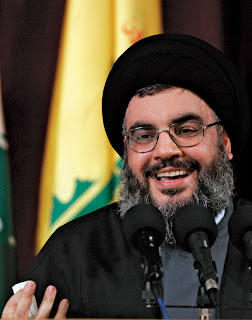Revered in much of the Arab world, Hassan Nasrallah became the leader of Hezbollah in 1992 after his predecessor was killed. Since taking power he has led Hezbollah forces in a number of military conflicts with Israel, the most notable being a 34-day war in 2006.
Profile
Hassan Nasrallah (born Aug. 31, 1960, Beirut, Lebanon) Lebanese militia and political leader who served as leader (secretary-general) of Hezbollah (Arabic: Party of God) from 1992.
Nasrallah was raised in the impoverished Karantina district of eastern Beirut, where his father ran a small grocery store. As a boy Nasrallah was an earnest student of Islam. After the outbreak of civil war in Lebanon in 1975 caused the family to flee south from Beirut, Nasrallah joined Amal, a Lebanese Shite paramilitary group with ties to Iran and Syria. Soon afterward he left for Najaf, Iraq, to study at the Shite seminary there. Following the expulsion of hundreds of Lebanese students from Iraq in 1978, he returned to Lebanon and fought with Amal, becoming the group's Al-Biq Valley commander. Following Israel's invasion of Lebanon in 1982, Nasrallah left Amal to join the nascent Hezbollah movement, a more-radical force that was heavily influenced by Ayatollah Ruhollah Khomeini and the 1979 Islamic Revolution in Iran.
Nasrallah rose through Hezbollah's ranks, and in 1988, when tensions with Amal flared, Nasrallah fought on the front lines. He assumed leadership of Hezbollah in 1992 after his predecessor, Sheikh Abbas al-Musawi, was killed by an Israeli missile. As a leader and cleric, Nasrallah relied on charisma and subtle charm to express his message. He was not a fiery or intimidating speaker. Rather, he came across as thoughtful, humble, and at times humorous. He emphasized the importance of Arab dignity and honour.
Under Nasrallah, Hezbollah staged attacks on Israeli forces occupying southern Lebanon until Israel withdrew in 2000. Nasrallah was not unscathed in the effort. In 1997 his 18-year-old son, Hadi, was killed while fighting Israeli forces. Nasrallah was also credited with arranging a prisoner exchange with Israel in 2004 that many Arabs considered a victory.
In July 2006, in an effort to pressure Israel into releasing three Lebanese jailed in Israeli prisons, Hezbollah paramilitary forces launched a military operation from the south, killing a number of Israeli soldiers and abducting two. This action led Israel to launch a major military offensive against Hezbollah. At the beginning of the war, some Arab leaders criticized Nasrallah and Hezbollah for inciting the conflict. But by the end of the 34-day war, which resulted in the deaths of 1,000 Lebanese and the displacement of some one million others, Nasrallah had declared victory and had emerged as a revered leader in much of the Arab world, as Hezbollah was able to fight the Israeli Defense Forces to a standstill—a feat that no other Arab militia had accomplished.
From : www.biography.com

